备战2021 中考英语 第1轮 第1类 个人情况与兴趣(课件共67张)
文档属性
| 名称 | 备战2021 中考英语 第1轮 第1类 个人情况与兴趣(课件共67张) |

|
|
| 格式 | ppt | ||
| 文件大小 | 2.0MB | ||
| 资源类型 | 教案 | ||
| 版本资源 | 通用版 | ||
| 科目 | 英语 | ||
| 更新时间 | 2021-01-07 00:00:00 | ||
图片预览

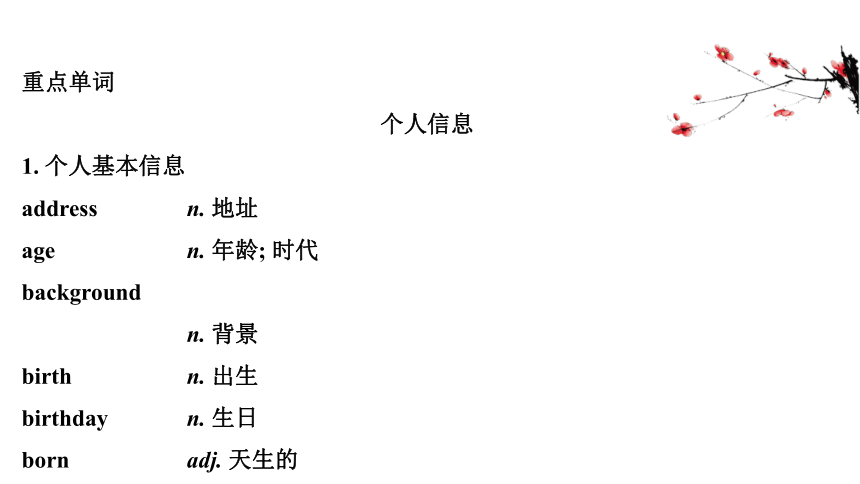
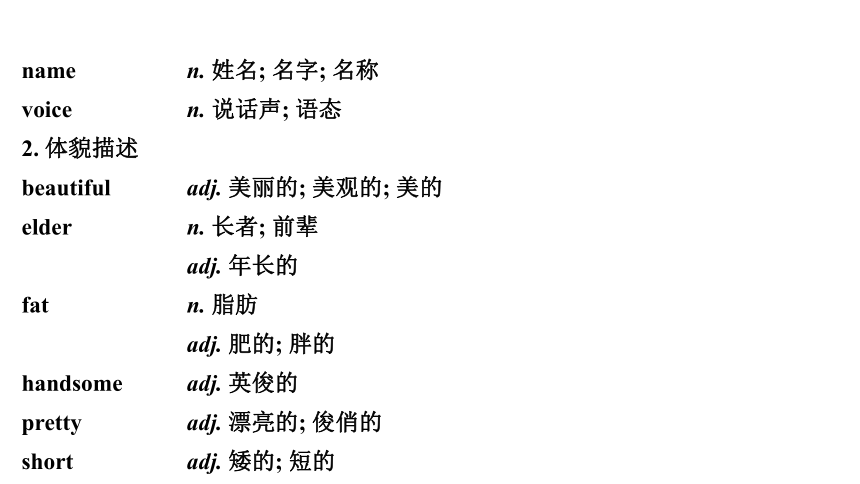
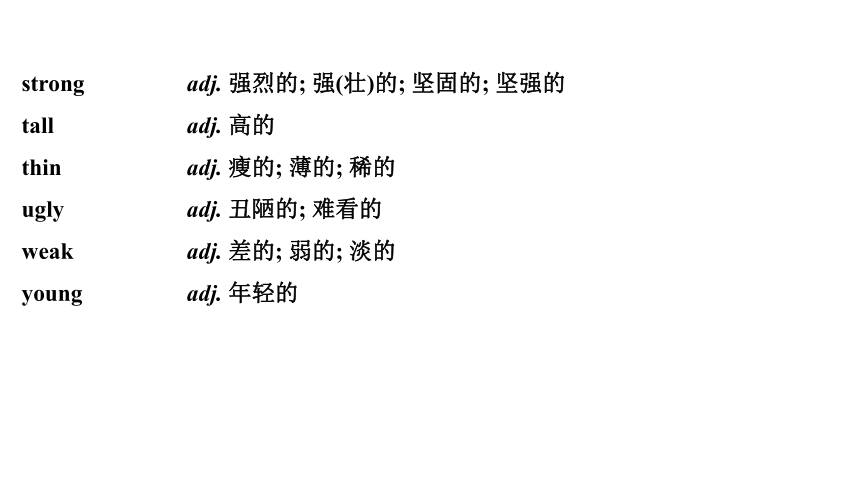
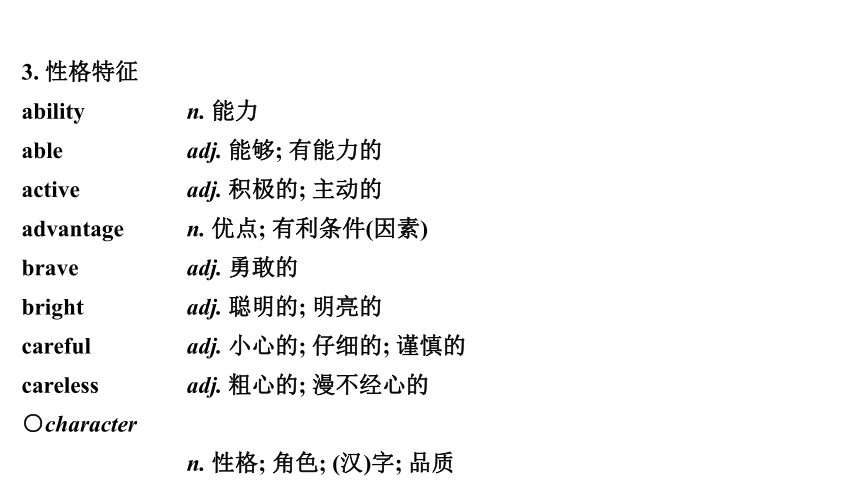

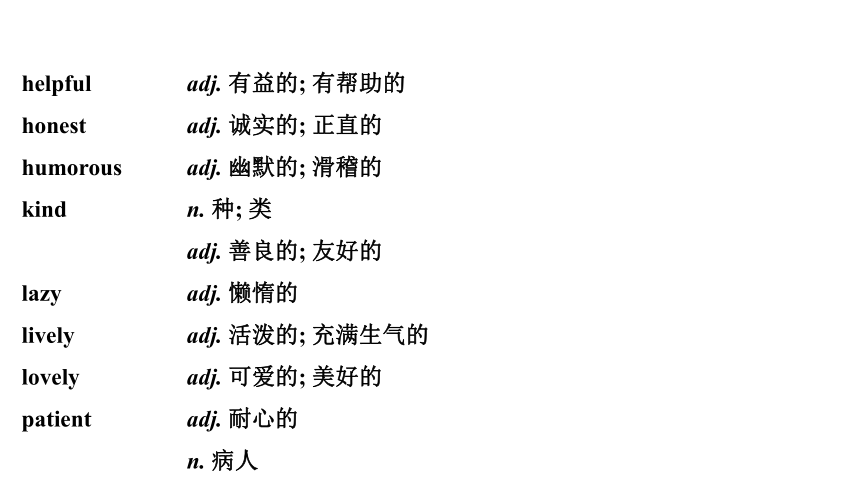
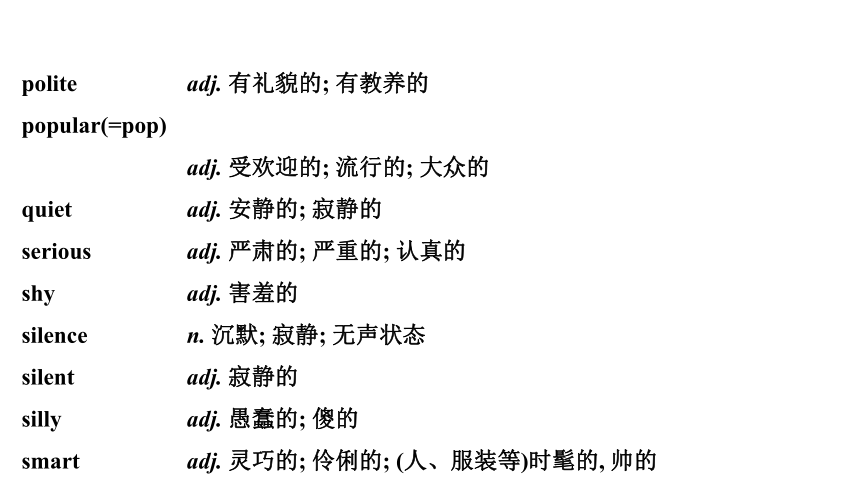
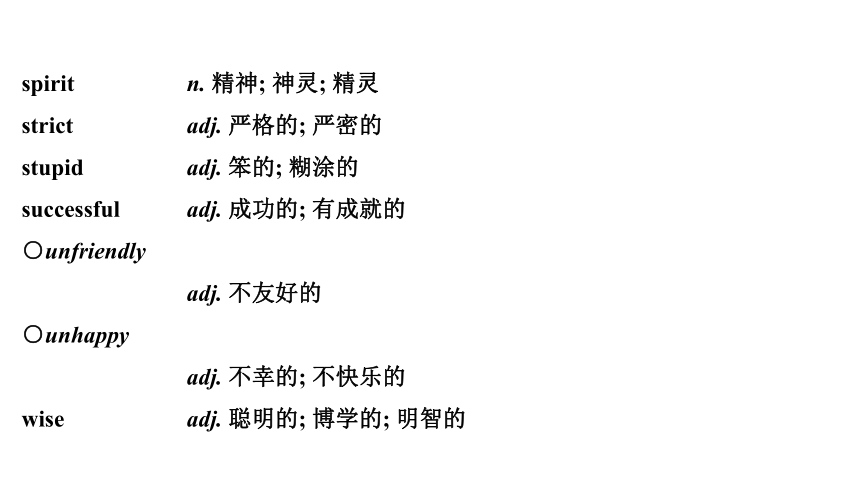
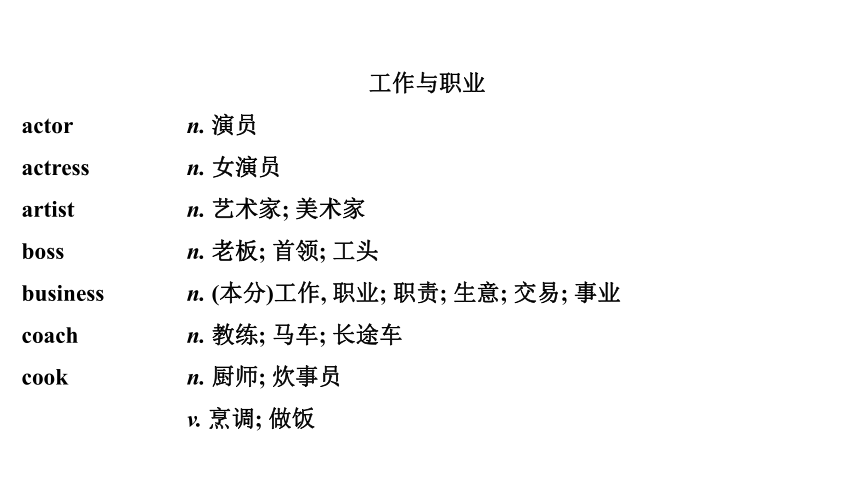

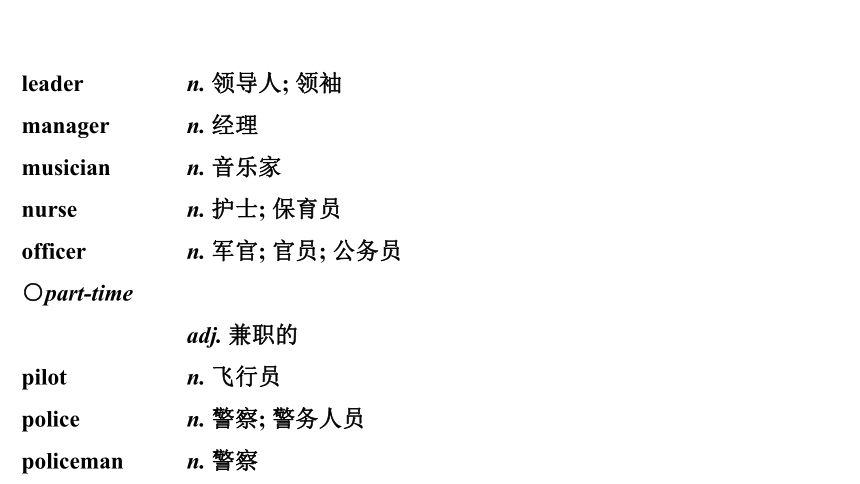
文档简介
第1轮 课标词汇与增补词汇突破
第一类 个人情况与兴趣
重点单词
个人信息
1. 个人基本信息
address n. 地址
age n. 年龄; 时代
background
n. 背景
birth n. 出生
birthday n. 生日
born adj. 天生的
话题词汇·分类记忆
name n. 姓名; 名字; 名称
voice n. 说话声; 语态
2. 体貌描述
beautiful adj. 美丽的; 美观的; 美的
elder n. 长者; 前辈
adj. 年长的
fat n. 脂肪
adj. 肥的; 胖的
handsome adj. 英俊的
pretty adj. 漂亮的; 俊俏的
short adj. 矮的; 短的
strong adj. 强烈的; 强(壮)的; 坚固的; 坚强的
tall adj. 高的
thin adj. 瘦的; 薄的; 稀的
ugly adj. 丑陋的; 难看的
weak adj. 差的; 弱的; 淡的
young adj. 年轻的
3. 性格特征
ability n. 能力
able adj. 能够; 有能力的
active adj. 积极的; 主动的
advantage n. 优点; 有利条件(因素)
brave adj. 勇敢的
bright adj. 聪明的; 明亮的
careful adj. 小心的; 仔细的; 谨慎的
careless adj. 粗心的; 漫不经心的
○character
n. 性格; 角色; (汉)字; 品质
clever adj. 聪明的; 伶俐的
courage n. 勇敢; 胆量
cute adj. 漂亮的; 逗人喜爱的
○dishonest
adj. 不诚实的
○energy n. 精力; 能量
excellent adj. 极好的; 优秀的
friendly adj. 友好的
funny adj. 有趣的; 滑稽可笑的
helpful adj. 有益的; 有帮助的
honest adj. 诚实的; 正直的
humorous adj. 幽默的; 滑稽的
kind n. 种; 类
adj. 善良的; 友好的
lazy adj. 懒惰的
lively adj. 活泼的; 充满生气的
lovely adj. 可爱的; 美好的
patient adj. 耐心的
n. 病人
polite adj. 有礼貌的; 有教养的
popular(=pop)
adj. 受欢迎的; 流行的; 大众的
quiet adj. 安静的; 寂静的
serious adj. 严肃的; 严重的; 认真的
shy adj. 害羞的
silence n. 沉默; 寂静; 无声状态
silent adj. 寂静的
silly adj. 愚蠢的; 傻的
smart adj. 灵巧的; 伶俐的; (人、服装等)时髦的, 帅的
spirit n. 精神; 神灵; 精灵
strict adj. 严格的; 严密的
stupid adj. 笨的; 糊涂的
successful adj. 成功的; 有成就的
○unfriendly
adj. 不友好的
○unhappy
adj. 不幸的; 不快乐的
wise adj. 聪明的; 博学的; 明智的
工作与职业
actor n. 演员
actress n. 女演员
artist n. 艺术家; 美术家
boss n. 老板; 首领; 工头
business n. (本分)工作, 职业; 职责; 生意; 交易; 事业
coach n. 教练; 马车; 长途车
cook n. 厨师; 炊事员
v. 烹调; 做饭
doctor n. 医生, 大夫; 博士
driver n. 驾驶员; 司机
engineer n. 工程师; 技师
farmer n. 农民
fisherman n. 渔夫; 渔人
guard n. 警戒; 看守
v. 守卫
job n. (一份)工作
king n. 国王
leader n. 领导人; 领袖
manager n. 经理
musician n. 音乐家
nurse n. 护士; 保育员
officer n. 军官; 官员; 公务员
○part-time
adj. 兼职的
pilot n. 飞行员
police n. 警察; 警务人员
policeman n. 警察
policewoman
n. 女警察
postman n. 邮递员; 邮差
president n. 主席; 总统
queen n. 皇后; 女王
○reporter
n. 记者
scientist n. 科学家
secretary n. 秘书
○singer n. 歌手
○soldier n. 士兵; 军人
speaker n. 演讲人; 演说家; 扬声器
teacher n. 教师; 教员
○waiter
n. 侍者; 服务员
work n. 工作; 劳动; 事情; 作品
v. 工作; (机器、器官等)运转; 活动
worker n. 工作者; 工人
writer n. 作者; 作家
兴趣与爱好
collect v. 收集; 搜集
○collection
n. 收集物
draw v. 绘画; 绘制; 拉, 拖; 提取(金钱)
enjoy v. 欣赏; 享受……之乐趣; 喜欢
favorite(=favourite)
adj. 喜爱的
n. 特别喜爱的人(或物)
hobby n. 业余爱好; 嗜好
interest v. 使感兴趣
n. 兴趣; 趣味; 利息
like v. 喜欢; 喜爱
prep. 像, 跟……一样
love v. &n. 爱; 热爱; 很喜欢
paint v. 刷漆; 粉刷; 绘画
n. 油漆
○prefer v. 更喜欢
record n. 唱片; 记录
v. 记录
sing v. 唱; 唱歌
休闲娱乐活动
camp n. 露营; 营地
v. 野营; 宿营
climb v. 爬; 攀登
dance v. 跳舞
n. 舞蹈
joke n. 笑话
relax v. (使)放松, 轻松
skate v. 滑冰; 溜冰
watch v. 观看; 注视; 当心; 注意
n. 手表; 表
玩具
ball n. 球
balloon n. 气球
chess n. 棋; 国际象棋
kite n. 风筝
toy n. 玩具; 玩物
重点词汇拓展
名词拓展:
1. friend (n. )→ _______(adj. )友好的
→ __________(adj. )不友好的
→ _________(n. )友谊
2. help (n. &v. )→ _______(adj. )有帮助的
→ _______(adj. )无助的
3. silence (n. )→ _____(adj. )安静的
→ _______(adv. )安静地
friendly
unfriendly
friendship
helpful
helpless
silent
silently
4. success (n. )→ _______(v. )成功
→ _________(adj. )成功的
→ ___________(adv. )成功地
5. fisherman (n. )→ _________(pl. )渔夫; 渔人
6. music (n. )→ _______(adj. )音乐的
→ ________(n. )音乐家
7. postman (n. )→ ________(pl. )邮递员
8. policeman (n. )→ _________(pl. )警察
9. science (n. )→ _______(n. )科学家
10. hobby (n. )→ _______(pl. )业余爱好
succeed
successful
successfully
fishermen
musical
musician
postmen
policemen
scientist
hobbies
11. interest (n. &v. )→ __________(adj. )有趣的
→ _________(adj. )感兴趣的
12. watch (n. )→ _______(pl. )手表
13. ability (n. )→ ____(adj. )能够的
→ ______(反义词)不能的
→ ________(adj. )残疾的
interesting
interested
watches
able
unable
disabled
动词拓展:
14. drive (v. )→ _____(过去式)驾驶; 驱赶
→ ______(过去分词)
→ ______(n. )司机
15. lead (v. )→ ___(过去式/过去分词)领导; 带领
→ ______(n. )领导
16. speak (v. )→ _____(过去式)讲(某种语言)
→ _______(过去分词)
→ _______(n. )演讲人
drove
driven
driver
led
leader
spoke
spoken
speaker
17. draw (v. )→ _____(过去式)绘画; 绘制; 吸引; 拖, 拉
→ ______(过去分词)
18. enjoy (v. )→ _________(adj. )快乐的
19. prefer (v. )→ _________(过去式/过去分词)更喜欢
20. sing (v. )→ ____(过去式)唱歌
→ _____(过去分词)
→ ______(n. )歌手
drew
drawn
enjoyable
preferred
sang
sung
singer
形容词拓展:
21. beautiful (adj. )→ ______(n. )漂亮; 美丽
→ __________(adv. )漂亮地
22. fat (adj. )→ _____(比较级)
→ ______(最高级)
23. strong (adj. )→ ________(adv. )强烈地
24. thin (adj. )→ _______(比较级)
→ _______(最高级)
beauty
beautifully
fatter
fattest
strongly
thinner
thinnest
25. ugly (adj. )→ ______(比较级)
→ ______(最高级)
26. active (adj. )→ _______(n. )活动
→ _______(adv. )积极地
27. brave (adj. )→ _______(adv. )勇敢地
28. careful (adj. )→ ________(adv. )小心地
→ _______(反义词)粗心的
→ _________(adv. )粗心地
uglier
ugliest
activity
actively
bravely
carefully
careless
carelessly
29. patient (adj. )→ ________(adv. )有耐心地
→ _________(反义词)没有耐心的
30. polite (adj. )→ _______(adv. )有礼貌地
→ ________(反义词)无礼的
31. quiet (adj. )→ ______(adv. )安静地
32. serious (adj. )→ ________(adv. )严肃地
33. wise (adj. )→ ______(adv. )明智地
patiently
impatient
politely
impolite
quietly
seriously
wisely
重点短语
1. __________出生(于); 来自
2. _________能够; 可以
3. ____________擅长于……
4. _____________为……感到骄傲(自豪)
5. ____________赶上
6. ________________对……感兴趣
7. _____________准备(做)……; 乐意(做)……
8. ______创立; 架起; 建造; 开业
come from
be able to
be good at. . .
be proud of. . .
catch up with
be interested in. . .
be ready to. . .
set up
9. _______从事; 着手处理
10. _______过去常常(做某事)
11. ____________去散步
12. ___________________去游泳/滑冰
13. __________散步
14. _________谈论, 议论
take up
used to
go for a walk
go swimming/skating
take a walk
talk about
考点一 enjoy的用法(衢州: 2017. 57; 台州: 2017. 58)
【名师解析】
enjoy意为“享受; 喜欢; 欣赏”, 为及物动词, 相当于“like. . . very much”或“be interested in”。常用结构:
(1)enjoy sth. /doing sth. 喜欢(做)某事, 后接名词或动名词作宾语。
如: Do you enjoy listening to rock music?
你喜欢听摇滚乐吗?
高频考点·精讲精练
(2)enjoy oneself意为“玩得开心”, 后接反身代词作宾语, 相当于“have a good time”或“have fun”。
如: They enjoyed themselves at the party.
他们在晚会上玩得很开心。
【先悟后练】
1. (2019·莱芜)He enjoyed _______(he) at the party that night.
2. (2019·柳州)Lily enjoys ______(see) a film at the weekend.
3. (2020·百色) We enjoyed ________(us) at the English party last weekend.
4. (2020·乐山) The students were having great fun in the park when it rained
suddenly. (改为同义句)
The students were ________ __________ in the park when it rained suddenly.
himself
seeing
ourselves
enjoying
themselves
考点二 prefer的用法(湖州: 2019. 65; 台州: 2017. 53; 杭州: 2017. 63)
【名师解析】
如: The southerners prefer rice, while the northerners prefer noodles.
南方人更喜欢吃米饭, 而北方人更喜欢吃面条。
He prefers coffee to tea.
与茶相比, 他更喜欢咖啡。
My younger brother prefers playing the piano to playing football. 比起踢足球, 我弟弟更喜欢弹钢琴。
【先悟后练】
5. (2020·自贡) I ______(更喜欢) reading books at home to hanging out with
friends every weekend.
6. (2020·龙东) I ______DingTalk __Tencent Meeting. What about you? (比
起……更喜欢……)
7. (2019· 天水)Businessmen prefer _______(write) e-mails to communicate with
each other rather than _____(make) phone calls. ?
prefer
prefer
to
to write
make
8. Girls prefer _____(go) shopping rather than stay at home on weekends.
9. Many old people prefer _____in the peaceful countryside to _____in the big
city, because they can enjoy fresh air and blue sky there. (live)
10. (2019·安顺)—What a heavy rain!
—So it is. I prefer ______(stay) at home rather than ___(go) out on such a rainy
day. ??
to go
living
living
to stay
go
11. I prefer math __English. I can get a lot of fun in solving math problems. (填入
适当的介词)
12. They like playing basketball in the club better than going home after school.
(改为同义句)
They ______playing basketball in the club __going home after school.
to
prefer
to
考点三 辨析noise, sound与voice(衢州: 2019. 21; 宁波: 2019. 3)
【名师解析】
voice, noise和sound这三个名词都可以表示“声音”, 但是它们表示的“声音”并不相同。
考点
意义与用法
例句
voice
“嗓音”, 指人的说话声或唱歌声。常用短语: in a low voice 小声地; in a loud voice 大声地
The girl has a beautiful voice.
这个女孩的嗓音很美。
noise
“噪音; 吵闹声”, 常具有贬义, 表示令人心烦的、不和谐的响声。可以用some, any, much等词修饰
The noise of traffic kept him awake.
车辆的喧闹声使他睡不着。
考点
意义与用法
例句
sound
泛指一切声响, 指一切可以听到的声音
At midnight he heard a strange sound.
半夜里他听到一种奇怪的声音。
【先悟后练】
13. (2019·泰安)It’s good manners to keep your v____ down in public.
14. A team of American and Canadian scientists discovered that louder n____
can seriously hurt some animals.
oice
oise
15. sound, voice, noise
①(2019· 淮安)Betty has a beautiful _____. She wants to be a singer in the future.
②He could hear the ______of a radio playing a pop song.
③Don’t make any _____. Your grandfather is sleeping in bed.
voice
sound
noise
考点四 辨析alive, live, lively与living
【名师解析】
考点
意义
用法
例句
alive
活着的; 在世的; 存在的
作表语、宾语补足语或者后置定语
多用于指人, 也可指物。如: This is a fish alive. 这是一条活鱼。
lively
活泼的, 生机勃勃的
可作表语、前置定语或宾语补足语
既可指人, 也可指物。如: She is a lively girl. 她是个活泼的女孩。
考点
意义
用法
例句
live
活着的; 有生命力的; 实况转播的
只用作前置定语
只可修饰物, 不可修饰人。如: a live fish一条活鱼; a live concert一场现场直播的音乐会。
living
活的; 健在的
常用作表语或定语
既可用于指物, 也可用于指人。
【先悟后练】
16. alive, live, living
①(2019·铁岭)His grandfather did his best to keep the tree _____, but it died in
the end.
②Jim is watching a ____football match which is shown on TV. Though he is not
on the scene, he can still cheer for his team.
③Zoos are like _____textbooks for young people.
④____concerts are never quite the same on the small screen.
alive
live
living
Live
17. (2020·鄂州中考)How fast Ezhou develops! It becomes one of _____________
(live) cities. ?
the most lively
考点五 辨析succeed, success, successful与successfully
【名师解析】
考点
意义与用法
例句
success
名词, 意为“成功”, 表示抽象意义的“成功”, 是不可数名词; 表示具体意义的“成功的人或事”, 是可数名词
They have achieved remarkable success in their work.
他们在工作方面已取得显著成绩。
succeed
动词, 意为“成功”, succeed in doing sth. 成功做某事
He succeeded in getting the job. 他成功获得了那份工作。
考点
意义与用法
例句
successful
形容词, 意为“成功的”, be successful in doing sth. 成功做某事
He was successful in doing the experiment.
他成功做了这个实验。
successfully
副词, 意为“成功地”, 用来修饰动词
He finished the task successfully. 他成功地完成了任务。
【先悟后练】
18. (2020·武威) I believe you will _______(success) in passing the English exam.
19. I hope to enter my dream high school ___________(成功地) through my hard
work.
succeed
successfully
20. success, succeed, successful, successfully
①The teacher always tells her students that she hopes all of them will become
_________no matter what kind of job they will take up in the future.
②Spud Webb never gave up. As a result, he _________in playing in the NBA.
③My people, My Hometown won a big _______due to its humorous storyline (剧
情).
④(2020·盐城)Tan Dun has ___________brought Chinese and Western music
together.
⑤(2019·莱芜)As we all know, hard work is the key to _______.
successful
succeeded
success
successfully
success
21. (2020·随州)通往成功的道路是多么艰难!
_____difficult the road to _______is!
22. (2019·自贡)知道你的长处, 并成功地利用, 一人可抵万人。
Know your strengths, use them ___________and one man can be worth ten
thousand.
How
success
successfully
考点六 辨析be good at, be good for, be good to与be good with
【名师解析】
考点
意义与用法
be good at
“擅长于”, 相当于do well in, at后接名词、代词或v. -ing形式
be good with
“善于应付……的; 对……有办法”, 后面常接表示人的名词或代词
be good for
“对……有好处”, 其反义短语为be bad for, 意为“对……有害; 对……有坏处”
be good to
“对……友好”, 其同义短语为be kind/friendly to, 后跟名词或代词
如: My deskmate is very good at playing chess.
我同桌很擅长下象棋。
He is very good with the old.
他很善于和老人打交道。
Vegetables are good for your health.
蔬菜对你的健康有好处。
The young should be good to the old.
年轻人应该善待老年人。
【先悟后练】
23. 根据句意用适当的介词填空。
①Chinese people are good __using tea to make other things delicious.
② Washing hands with soap is good ___public health.
③Teachers wanted! Are you good ____children? Come and join us!
at
for
with
24. (2020·枣庄) 这位老师对学生很有一套。
The teacher is very _____ ____ students.
25. (2020· 黔南州)Judy does well in physics and she always helps me with my
study. (改为同义句)
Judy __ _____ __ physics and she always helps me with my study.
good
with
is
good
at
考点七 辨析be able to与can(温州: 2019. 6)
【名师解析】
考点
用法
can
强调自身已具有的能力, 还可用于表示可能性、请求允许等情况, 只有一般现在时和一般过去时两种时态
be able to
强调通过努力而获得的能力, 可用于各种时态
如: She was able to walk when she was only 10 months old. 她只有10个月大时就会走路了。
The bus can carry 60 passengers.
这辆公共汽车能载60名乘客。
【先悟后练】
26. be able to, can
①(2020· 绥化)I _____________spell this word. ?
②We are sure he will _________be an artist when he grows up. ?
③— ____we leave school after 6: 00 p. m. ?
—No, you have to leave school before 5: 30 p. m.
am able to/can
be able to
Can
考点八 辨析be used to do/for doing sth. , be/get used to doing sth. 与used to do sth. (绍兴/义乌: 2018. 69)
【名师解析】
考点
意义及用法
例句
used to do
sth.
意为“过去常常做某事”, to是动词不定式符号, 后面接动词原形
This place used to be a factory but now it is a park. 这个地方原来是一个工厂, 但现在是一个公园。
考点
意义及用法
例句
be/get used
to doing sth.
意为“习惯于做某事”, to是介词, 后面接名词或动名词
Now he is used to living in a big city.
他现在习惯住在大城市。
be used to
do/for doing
sth.
意为“被用来做某事”, 表示被动语态结构
Stamps are used to send/for sending letters.
邮票是用来寄信的。
【先悟后练】
27. (2019·鄂州)I think AI(人工智能) ____in many fields will _______to help us
solve many problems in the future. (use)?
28. (2020·济宁) I used to ______(收集) stamps, but now I like drawing.
29. (2020·十堰) 李梅很勤奋, 她习惯于晨读。
Li Mei is hard-working and she ____________morning reading. ?
30. (2019·镇江)Yao Ming, a basketball giant, used ______(play) water polo when
he was young. ?
31. (2019·三黔)—My father _________(过去总是去) to his workplace by bus, but
now he _________________(习惯去) there by bike. ?
—Really? You have an environmentally-friendly father.
used
be used
collect
is/gets used to
to play
used to go
gets/is used to going
32. Computers are often used ________(search) for information. ?
33. 当你感到焦虑时, 你习惯做什么?
_____________________________________________________
34. (2020·牡丹江)Mudanjiang used to be a small town. (改为否定句)
Mudanjiang ______ ___ to be a small town.
to search
What are you used to doing when you feel worried/anxious? ?
didn’t
use
考点九 辨析job与work(嘉兴/舟山: 2018. 47)
【名师解析】
考点
意义与用法
work
表示“工作”, 是不可数名词, 多指需要花费体力或脑力的努力或劳动; 作动词时, 意为“工作”, 不及物动词, 其后不直接跟宾语
job
是可数名词, 多指为换取报酬而进行的日常活动
如: My father works in a hospital. 我爸爸在一家医院工作。
My father does lots of work every day.
我爸爸每天做很多工作。
He took a job as a waiter. 他找了一份当服务员的工作。
【先悟后练】
35. 根据句意用work或job填空。
①Robots have become common in many industries, and are often given ____that
are considered dangerous to humans.
②(2020· 天津)My father is still at _____at the moment.
jobs
work
考点十 辨析interested与interesting(拓展-ing与-ed形容词的辨析)(衢州: 2019. 67; 宁波: 2018. 55; 温州: 2018. 48)
【名师解析】
考点
含义
用法
v. -ing形容词
令人……的
形容物体本身具有的性质, 主语一般是物
v. -ed形容词
感到……的
形容人的感受, 主语一般是人
拓展: 常见v. -ing形容词和v. -ed形容词及相关短语:
v. -ing
v. -ed
相关短语
amazing
amazed
be amazed at对……感到惊讶
boring
bored
be bored with对……厌烦
exciting
excited
be excited about对……感到兴奋
interesting
interested
be interested in对……感兴趣
relaxing
relaxed
relax oneself放松(某人)自己
surprising
surprised
be surprised at对……感到惊奇
【先悟后练】
36. (2020·百色) John is _________(感兴趣的) in the film Wolf War Ⅱ.
37. (2019·贵港)When you are tired, you can go to a ________(令人放松的) place
to have a rest.
interested
relaxing
38. (2019·南通)—I hear people can pay for almost everything by ZHI FU BAO in
China.
—Actually, it’s _________(surprise) that people often go shopping without taking
any paper money.
39. (2020· 宜宾)Listen to a piece of light music and you will feel r______.
surprising
elaxed
第一类 个人情况与兴趣
重点单词
个人信息
1. 个人基本信息
address n. 地址
age n. 年龄; 时代
background
n. 背景
birth n. 出生
birthday n. 生日
born adj. 天生的
话题词汇·分类记忆
name n. 姓名; 名字; 名称
voice n. 说话声; 语态
2. 体貌描述
beautiful adj. 美丽的; 美观的; 美的
elder n. 长者; 前辈
adj. 年长的
fat n. 脂肪
adj. 肥的; 胖的
handsome adj. 英俊的
pretty adj. 漂亮的; 俊俏的
short adj. 矮的; 短的
strong adj. 强烈的; 强(壮)的; 坚固的; 坚强的
tall adj. 高的
thin adj. 瘦的; 薄的; 稀的
ugly adj. 丑陋的; 难看的
weak adj. 差的; 弱的; 淡的
young adj. 年轻的
3. 性格特征
ability n. 能力
able adj. 能够; 有能力的
active adj. 积极的; 主动的
advantage n. 优点; 有利条件(因素)
brave adj. 勇敢的
bright adj. 聪明的; 明亮的
careful adj. 小心的; 仔细的; 谨慎的
careless adj. 粗心的; 漫不经心的
○character
n. 性格; 角色; (汉)字; 品质
clever adj. 聪明的; 伶俐的
courage n. 勇敢; 胆量
cute adj. 漂亮的; 逗人喜爱的
○dishonest
adj. 不诚实的
○energy n. 精力; 能量
excellent adj. 极好的; 优秀的
friendly adj. 友好的
funny adj. 有趣的; 滑稽可笑的
helpful adj. 有益的; 有帮助的
honest adj. 诚实的; 正直的
humorous adj. 幽默的; 滑稽的
kind n. 种; 类
adj. 善良的; 友好的
lazy adj. 懒惰的
lively adj. 活泼的; 充满生气的
lovely adj. 可爱的; 美好的
patient adj. 耐心的
n. 病人
polite adj. 有礼貌的; 有教养的
popular(=pop)
adj. 受欢迎的; 流行的; 大众的
quiet adj. 安静的; 寂静的
serious adj. 严肃的; 严重的; 认真的
shy adj. 害羞的
silence n. 沉默; 寂静; 无声状态
silent adj. 寂静的
silly adj. 愚蠢的; 傻的
smart adj. 灵巧的; 伶俐的; (人、服装等)时髦的, 帅的
spirit n. 精神; 神灵; 精灵
strict adj. 严格的; 严密的
stupid adj. 笨的; 糊涂的
successful adj. 成功的; 有成就的
○unfriendly
adj. 不友好的
○unhappy
adj. 不幸的; 不快乐的
wise adj. 聪明的; 博学的; 明智的
工作与职业
actor n. 演员
actress n. 女演员
artist n. 艺术家; 美术家
boss n. 老板; 首领; 工头
business n. (本分)工作, 职业; 职责; 生意; 交易; 事业
coach n. 教练; 马车; 长途车
cook n. 厨师; 炊事员
v. 烹调; 做饭
doctor n. 医生, 大夫; 博士
driver n. 驾驶员; 司机
engineer n. 工程师; 技师
farmer n. 农民
fisherman n. 渔夫; 渔人
guard n. 警戒; 看守
v. 守卫
job n. (一份)工作
king n. 国王
leader n. 领导人; 领袖
manager n. 经理
musician n. 音乐家
nurse n. 护士; 保育员
officer n. 军官; 官员; 公务员
○part-time
adj. 兼职的
pilot n. 飞行员
police n. 警察; 警务人员
policeman n. 警察
policewoman
n. 女警察
postman n. 邮递员; 邮差
president n. 主席; 总统
queen n. 皇后; 女王
○reporter
n. 记者
scientist n. 科学家
secretary n. 秘书
○singer n. 歌手
○soldier n. 士兵; 军人
speaker n. 演讲人; 演说家; 扬声器
teacher n. 教师; 教员
○waiter
n. 侍者; 服务员
work n. 工作; 劳动; 事情; 作品
v. 工作; (机器、器官等)运转; 活动
worker n. 工作者; 工人
writer n. 作者; 作家
兴趣与爱好
collect v. 收集; 搜集
○collection
n. 收集物
draw v. 绘画; 绘制; 拉, 拖; 提取(金钱)
enjoy v. 欣赏; 享受……之乐趣; 喜欢
favorite(=favourite)
adj. 喜爱的
n. 特别喜爱的人(或物)
hobby n. 业余爱好; 嗜好
interest v. 使感兴趣
n. 兴趣; 趣味; 利息
like v. 喜欢; 喜爱
prep. 像, 跟……一样
love v. &n. 爱; 热爱; 很喜欢
paint v. 刷漆; 粉刷; 绘画
n. 油漆
○prefer v. 更喜欢
record n. 唱片; 记录
v. 记录
sing v. 唱; 唱歌
休闲娱乐活动
camp n. 露营; 营地
v. 野营; 宿营
climb v. 爬; 攀登
dance v. 跳舞
n. 舞蹈
joke n. 笑话
relax v. (使)放松, 轻松
skate v. 滑冰; 溜冰
watch v. 观看; 注视; 当心; 注意
n. 手表; 表
玩具
ball n. 球
balloon n. 气球
chess n. 棋; 国际象棋
kite n. 风筝
toy n. 玩具; 玩物
重点词汇拓展
名词拓展:
1. friend (n. )→ _______(adj. )友好的
→ __________(adj. )不友好的
→ _________(n. )友谊
2. help (n. &v. )→ _______(adj. )有帮助的
→ _______(adj. )无助的
3. silence (n. )→ _____(adj. )安静的
→ _______(adv. )安静地
friendly
unfriendly
friendship
helpful
helpless
silent
silently
4. success (n. )→ _______(v. )成功
→ _________(adj. )成功的
→ ___________(adv. )成功地
5. fisherman (n. )→ _________(pl. )渔夫; 渔人
6. music (n. )→ _______(adj. )音乐的
→ ________(n. )音乐家
7. postman (n. )→ ________(pl. )邮递员
8. policeman (n. )→ _________(pl. )警察
9. science (n. )→ _______(n. )科学家
10. hobby (n. )→ _______(pl. )业余爱好
succeed
successful
successfully
fishermen
musical
musician
postmen
policemen
scientist
hobbies
11. interest (n. &v. )→ __________(adj. )有趣的
→ _________(adj. )感兴趣的
12. watch (n. )→ _______(pl. )手表
13. ability (n. )→ ____(adj. )能够的
→ ______(反义词)不能的
→ ________(adj. )残疾的
interesting
interested
watches
able
unable
disabled
动词拓展:
14. drive (v. )→ _____(过去式)驾驶; 驱赶
→ ______(过去分词)
→ ______(n. )司机
15. lead (v. )→ ___(过去式/过去分词)领导; 带领
→ ______(n. )领导
16. speak (v. )→ _____(过去式)讲(某种语言)
→ _______(过去分词)
→ _______(n. )演讲人
drove
driven
driver
led
leader
spoke
spoken
speaker
17. draw (v. )→ _____(过去式)绘画; 绘制; 吸引; 拖, 拉
→ ______(过去分词)
18. enjoy (v. )→ _________(adj. )快乐的
19. prefer (v. )→ _________(过去式/过去分词)更喜欢
20. sing (v. )→ ____(过去式)唱歌
→ _____(过去分词)
→ ______(n. )歌手
drew
drawn
enjoyable
preferred
sang
sung
singer
形容词拓展:
21. beautiful (adj. )→ ______(n. )漂亮; 美丽
→ __________(adv. )漂亮地
22. fat (adj. )→ _____(比较级)
→ ______(最高级)
23. strong (adj. )→ ________(adv. )强烈地
24. thin (adj. )→ _______(比较级)
→ _______(最高级)
beauty
beautifully
fatter
fattest
strongly
thinner
thinnest
25. ugly (adj. )→ ______(比较级)
→ ______(最高级)
26. active (adj. )→ _______(n. )活动
→ _______(adv. )积极地
27. brave (adj. )→ _______(adv. )勇敢地
28. careful (adj. )→ ________(adv. )小心地
→ _______(反义词)粗心的
→ _________(adv. )粗心地
uglier
ugliest
activity
actively
bravely
carefully
careless
carelessly
29. patient (adj. )→ ________(adv. )有耐心地
→ _________(反义词)没有耐心的
30. polite (adj. )→ _______(adv. )有礼貌地
→ ________(反义词)无礼的
31. quiet (adj. )→ ______(adv. )安静地
32. serious (adj. )→ ________(adv. )严肃地
33. wise (adj. )→ ______(adv. )明智地
patiently
impatient
politely
impolite
quietly
seriously
wisely
重点短语
1. __________出生(于); 来自
2. _________能够; 可以
3. ____________擅长于……
4. _____________为……感到骄傲(自豪)
5. ____________赶上
6. ________________对……感兴趣
7. _____________准备(做)……; 乐意(做)……
8. ______创立; 架起; 建造; 开业
come from
be able to
be good at. . .
be proud of. . .
catch up with
be interested in. . .
be ready to. . .
set up
9. _______从事; 着手处理
10. _______过去常常(做某事)
11. ____________去散步
12. ___________________去游泳/滑冰
13. __________散步
14. _________谈论, 议论
take up
used to
go for a walk
go swimming/skating
take a walk
talk about
考点一 enjoy的用法(衢州: 2017. 57; 台州: 2017. 58)
【名师解析】
enjoy意为“享受; 喜欢; 欣赏”, 为及物动词, 相当于“like. . . very much”或“be interested in”。常用结构:
(1)enjoy sth. /doing sth. 喜欢(做)某事, 后接名词或动名词作宾语。
如: Do you enjoy listening to rock music?
你喜欢听摇滚乐吗?
高频考点·精讲精练
(2)enjoy oneself意为“玩得开心”, 后接反身代词作宾语, 相当于“have a good time”或“have fun”。
如: They enjoyed themselves at the party.
他们在晚会上玩得很开心。
【先悟后练】
1. (2019·莱芜)He enjoyed _______(he) at the party that night.
2. (2019·柳州)Lily enjoys ______(see) a film at the weekend.
3. (2020·百色) We enjoyed ________(us) at the English party last weekend.
4. (2020·乐山) The students were having great fun in the park when it rained
suddenly. (改为同义句)
The students were ________ __________ in the park when it rained suddenly.
himself
seeing
ourselves
enjoying
themselves
考点二 prefer的用法(湖州: 2019. 65; 台州: 2017. 53; 杭州: 2017. 63)
【名师解析】
如: The southerners prefer rice, while the northerners prefer noodles.
南方人更喜欢吃米饭, 而北方人更喜欢吃面条。
He prefers coffee to tea.
与茶相比, 他更喜欢咖啡。
My younger brother prefers playing the piano to playing football. 比起踢足球, 我弟弟更喜欢弹钢琴。
【先悟后练】
5. (2020·自贡) I ______(更喜欢) reading books at home to hanging out with
friends every weekend.
6. (2020·龙东) I ______DingTalk __Tencent Meeting. What about you? (比
起……更喜欢……)
7. (2019· 天水)Businessmen prefer _______(write) e-mails to communicate with
each other rather than _____(make) phone calls. ?
prefer
prefer
to
to write
make
8. Girls prefer _____(go) shopping rather than stay at home on weekends.
9. Many old people prefer _____in the peaceful countryside to _____in the big
city, because they can enjoy fresh air and blue sky there. (live)
10. (2019·安顺)—What a heavy rain!
—So it is. I prefer ______(stay) at home rather than ___(go) out on such a rainy
day. ??
to go
living
living
to stay
go
11. I prefer math __English. I can get a lot of fun in solving math problems. (填入
适当的介词)
12. They like playing basketball in the club better than going home after school.
(改为同义句)
They ______playing basketball in the club __going home after school.
to
prefer
to
考点三 辨析noise, sound与voice(衢州: 2019. 21; 宁波: 2019. 3)
【名师解析】
voice, noise和sound这三个名词都可以表示“声音”, 但是它们表示的“声音”并不相同。
考点
意义与用法
例句
voice
“嗓音”, 指人的说话声或唱歌声。常用短语: in a low voice 小声地; in a loud voice 大声地
The girl has a beautiful voice.
这个女孩的嗓音很美。
noise
“噪音; 吵闹声”, 常具有贬义, 表示令人心烦的、不和谐的响声。可以用some, any, much等词修饰
The noise of traffic kept him awake.
车辆的喧闹声使他睡不着。
考点
意义与用法
例句
sound
泛指一切声响, 指一切可以听到的声音
At midnight he heard a strange sound.
半夜里他听到一种奇怪的声音。
【先悟后练】
13. (2019·泰安)It’s good manners to keep your v____ down in public.
14. A team of American and Canadian scientists discovered that louder n____
can seriously hurt some animals.
oice
oise
15. sound, voice, noise
①(2019· 淮安)Betty has a beautiful _____. She wants to be a singer in the future.
②He could hear the ______of a radio playing a pop song.
③Don’t make any _____. Your grandfather is sleeping in bed.
voice
sound
noise
考点四 辨析alive, live, lively与living
【名师解析】
考点
意义
用法
例句
alive
活着的; 在世的; 存在的
作表语、宾语补足语或者后置定语
多用于指人, 也可指物。如: This is a fish alive. 这是一条活鱼。
lively
活泼的, 生机勃勃的
可作表语、前置定语或宾语补足语
既可指人, 也可指物。如: She is a lively girl. 她是个活泼的女孩。
考点
意义
用法
例句
live
活着的; 有生命力的; 实况转播的
只用作前置定语
只可修饰物, 不可修饰人。如: a live fish一条活鱼; a live concert一场现场直播的音乐会。
living
活的; 健在的
常用作表语或定语
既可用于指物, 也可用于指人。
【先悟后练】
16. alive, live, living
①(2019·铁岭)His grandfather did his best to keep the tree _____, but it died in
the end.
②Jim is watching a ____football match which is shown on TV. Though he is not
on the scene, he can still cheer for his team.
③Zoos are like _____textbooks for young people.
④____concerts are never quite the same on the small screen.
alive
live
living
Live
17. (2020·鄂州中考)How fast Ezhou develops! It becomes one of _____________
(live) cities. ?
the most lively
考点五 辨析succeed, success, successful与successfully
【名师解析】
考点
意义与用法
例句
success
名词, 意为“成功”, 表示抽象意义的“成功”, 是不可数名词; 表示具体意义的“成功的人或事”, 是可数名词
They have achieved remarkable success in their work.
他们在工作方面已取得显著成绩。
succeed
动词, 意为“成功”, succeed in doing sth. 成功做某事
He succeeded in getting the job. 他成功获得了那份工作。
考点
意义与用法
例句
successful
形容词, 意为“成功的”, be successful in doing sth. 成功做某事
He was successful in doing the experiment.
他成功做了这个实验。
successfully
副词, 意为“成功地”, 用来修饰动词
He finished the task successfully. 他成功地完成了任务。
【先悟后练】
18. (2020·武威) I believe you will _______(success) in passing the English exam.
19. I hope to enter my dream high school ___________(成功地) through my hard
work.
succeed
successfully
20. success, succeed, successful, successfully
①The teacher always tells her students that she hopes all of them will become
_________no matter what kind of job they will take up in the future.
②Spud Webb never gave up. As a result, he _________in playing in the NBA.
③My people, My Hometown won a big _______due to its humorous storyline (剧
情).
④(2020·盐城)Tan Dun has ___________brought Chinese and Western music
together.
⑤(2019·莱芜)As we all know, hard work is the key to _______.
successful
succeeded
success
successfully
success
21. (2020·随州)通往成功的道路是多么艰难!
_____difficult the road to _______is!
22. (2019·自贡)知道你的长处, 并成功地利用, 一人可抵万人。
Know your strengths, use them ___________and one man can be worth ten
thousand.
How
success
successfully
考点六 辨析be good at, be good for, be good to与be good with
【名师解析】
考点
意义与用法
be good at
“擅长于”, 相当于do well in, at后接名词、代词或v. -ing形式
be good with
“善于应付……的; 对……有办法”, 后面常接表示人的名词或代词
be good for
“对……有好处”, 其反义短语为be bad for, 意为“对……有害; 对……有坏处”
be good to
“对……友好”, 其同义短语为be kind/friendly to, 后跟名词或代词
如: My deskmate is very good at playing chess.
我同桌很擅长下象棋。
He is very good with the old.
他很善于和老人打交道。
Vegetables are good for your health.
蔬菜对你的健康有好处。
The young should be good to the old.
年轻人应该善待老年人。
【先悟后练】
23. 根据句意用适当的介词填空。
①Chinese people are good __using tea to make other things delicious.
② Washing hands with soap is good ___public health.
③Teachers wanted! Are you good ____children? Come and join us!
at
for
with
24. (2020·枣庄) 这位老师对学生很有一套。
The teacher is very _____ ____ students.
25. (2020· 黔南州)Judy does well in physics and she always helps me with my
study. (改为同义句)
Judy __ _____ __ physics and she always helps me with my study.
good
with
is
good
at
考点七 辨析be able to与can(温州: 2019. 6)
【名师解析】
考点
用法
can
强调自身已具有的能力, 还可用于表示可能性、请求允许等情况, 只有一般现在时和一般过去时两种时态
be able to
强调通过努力而获得的能力, 可用于各种时态
如: She was able to walk when she was only 10 months old. 她只有10个月大时就会走路了。
The bus can carry 60 passengers.
这辆公共汽车能载60名乘客。
【先悟后练】
26. be able to, can
①(2020· 绥化)I _____________spell this word. ?
②We are sure he will _________be an artist when he grows up. ?
③— ____we leave school after 6: 00 p. m. ?
—No, you have to leave school before 5: 30 p. m.
am able to/can
be able to
Can
考点八 辨析be used to do/for doing sth. , be/get used to doing sth. 与used to do sth. (绍兴/义乌: 2018. 69)
【名师解析】
考点
意义及用法
例句
used to do
sth.
意为“过去常常做某事”, to是动词不定式符号, 后面接动词原形
This place used to be a factory but now it is a park. 这个地方原来是一个工厂, 但现在是一个公园。
考点
意义及用法
例句
be/get used
to doing sth.
意为“习惯于做某事”, to是介词, 后面接名词或动名词
Now he is used to living in a big city.
他现在习惯住在大城市。
be used to
do/for doing
sth.
意为“被用来做某事”, 表示被动语态结构
Stamps are used to send/for sending letters.
邮票是用来寄信的。
【先悟后练】
27. (2019·鄂州)I think AI(人工智能) ____in many fields will _______to help us
solve many problems in the future. (use)?
28. (2020·济宁) I used to ______(收集) stamps, but now I like drawing.
29. (2020·十堰) 李梅很勤奋, 她习惯于晨读。
Li Mei is hard-working and she ____________morning reading. ?
30. (2019·镇江)Yao Ming, a basketball giant, used ______(play) water polo when
he was young. ?
31. (2019·三黔)—My father _________(过去总是去) to his workplace by bus, but
now he _________________(习惯去) there by bike. ?
—Really? You have an environmentally-friendly father.
used
be used
collect
is/gets used to
to play
used to go
gets/is used to going
32. Computers are often used ________(search) for information. ?
33. 当你感到焦虑时, 你习惯做什么?
_____________________________________________________
34. (2020·牡丹江)Mudanjiang used to be a small town. (改为否定句)
Mudanjiang ______ ___ to be a small town.
to search
What are you used to doing when you feel worried/anxious? ?
didn’t
use
考点九 辨析job与work(嘉兴/舟山: 2018. 47)
【名师解析】
考点
意义与用法
work
表示“工作”, 是不可数名词, 多指需要花费体力或脑力的努力或劳动; 作动词时, 意为“工作”, 不及物动词, 其后不直接跟宾语
job
是可数名词, 多指为换取报酬而进行的日常活动
如: My father works in a hospital. 我爸爸在一家医院工作。
My father does lots of work every day.
我爸爸每天做很多工作。
He took a job as a waiter. 他找了一份当服务员的工作。
【先悟后练】
35. 根据句意用work或job填空。
①Robots have become common in many industries, and are often given ____that
are considered dangerous to humans.
②(2020· 天津)My father is still at _____at the moment.
jobs
work
考点十 辨析interested与interesting(拓展-ing与-ed形容词的辨析)(衢州: 2019. 67; 宁波: 2018. 55; 温州: 2018. 48)
【名师解析】
考点
含义
用法
v. -ing形容词
令人……的
形容物体本身具有的性质, 主语一般是物
v. -ed形容词
感到……的
形容人的感受, 主语一般是人
拓展: 常见v. -ing形容词和v. -ed形容词及相关短语:
v. -ing
v. -ed
相关短语
amazing
amazed
be amazed at对……感到惊讶
boring
bored
be bored with对……厌烦
exciting
excited
be excited about对……感到兴奋
interesting
interested
be interested in对……感兴趣
relaxing
relaxed
relax oneself放松(某人)自己
surprising
surprised
be surprised at对……感到惊奇
【先悟后练】
36. (2020·百色) John is _________(感兴趣的) in the film Wolf War Ⅱ.
37. (2019·贵港)When you are tired, you can go to a ________(令人放松的) place
to have a rest.
interested
relaxing
38. (2019·南通)—I hear people can pay for almost everything by ZHI FU BAO in
China.
—Actually, it’s _________(surprise) that people often go shopping without taking
any paper money.
39. (2020· 宜宾)Listen to a piece of light music and you will feel r______.
surprising
elaxed
